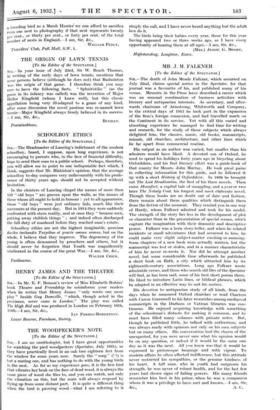MR. J. M. FALKNER
[To the Editor of the SPECTATOR.] Sta,—The death of John Meade Falkner, which occurred on July 22nd, claims special notice in the Spectator, for that journal was a favourite of his, and published many of his verses. Memoirs in the Press have described a career which was an unusual combination of business activities with literary and antiquarian interests. As secretary, and after- wards chairman of Armstrong, Whitworth and Company, in the critical days of 1915 he took part in the expansion of the firm's foreign connexion, and had travelled much on the Continent in its service. Yet with all this varied and absorbing experience he managed to find time for writing and research, for the study of those subjects which always delighted him, the classics, music, old books, manuscripts, missals, old churches, architecture, and other lines Which lie far apart from commercial routine.
His output as an author was varied, but smaller than his admirers would have liked. A devoted son of Oxford, he used to spend his holidays forty years ago in bicycling about Oxfordshire, and his first literary effort was a guide-book of that county for Messrs. John Murray. He took great pains in collecting information for this guide, and he followed it up with a short History of Oxfordshire. In 1890 he brought out The Lost Stradivarius, the first of his three novels. Then came Moontleet, a capital tale of smuggling, and a year or two later The Nebuly Coat, his longest and most elaborate novel. Though these books are no doubt out of date and fashion, there remain about them qualities which distinguish them from the fiction of the moment. They remind you in one way of Hardy, whom Falkner admired and took for his model. The strength of the story lies less in the development of plot or character than in the presentation of special scenes, which capture the imagination with their dramatic and descriptive power. Falkner was a born story-teller, and when he related incidents or small adventures that had occurred to him, he could make very slight subject-matter exciting or amusing. Some chapters of a new book were actually written, but the manuscript was lost or stolen, and in a manner characteristic of him he never re-wrote it. Nor did he attempt another novel, but some considerable time afterwards he published a short book on Bath, a city which attracted him by its eighteenth-century associations. Long ago Falkner wrote admirable verses, and those who search old files of the Spectator will find, as has been said, some of his best short poems there. He liked to introduce Latin lines, or biblical phrases, which he adapted in an effective way to suit his metres.
His devotion to antiquarian study of all kinds, from the days when he measured Oxford churches or read Charters with Canon Greenwell to his later researches among mediaeval manuscripts in the Durham or Vatican libraries was con- tinuous. He enjoyed acquiring knowledge with something of the schoolman's distaste for making it common, and he must have filled many volumes with private notes. But, though he published little, he talked with enthusiasm, and was always ready with opinions not only on his own subjects but on many others. His conversation had the charm of the unexpected, for you were never sure what his opinion would be on any question, or indeed if it would be the same one day as it was the next. All you knew was that it would be expressed in picturesque language and with vigour. To modern affairs he often affected indifference, but this attitude never restricted his sympathies, or the genuine kindness of his heart. A tall man, who in youth had outgrown his strength, he was never of robust health, and for the last few years had shown signs of failing powers. His many friends remember him best in his prime, when he was a companion whom it was a privilege to have met and known.—! am, Sir,


























 Previous page
Previous page